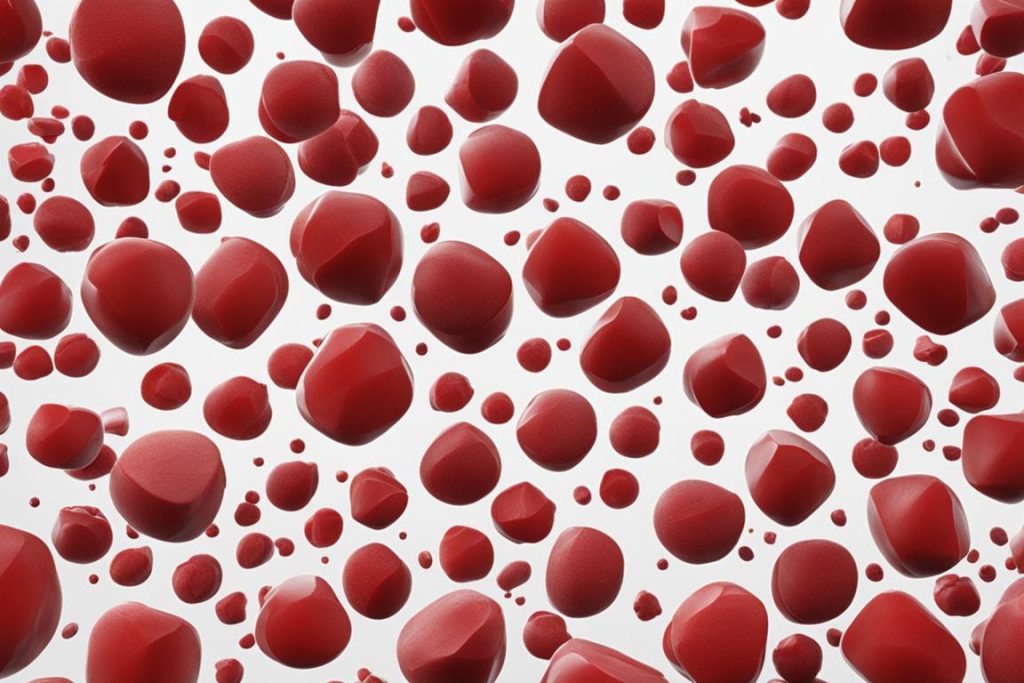Have you ever had a dream about blood clots? These dreams can be unsettling and leave you wondering about their meaning. Dreaming of blood clots can have both physical and psychological implications, and understanding their symbolism can provide valuable insights into your health and well-being.
When we dream of blood clots, it is important to consider the context and any potential health concerns. Blood clots are solidified clumps of blood that can form in different parts of the body and lead to serious conditions such as deep vein thrombosis, stroke, or pulmonary embolism. By analyzing the symbolism of blood clot dreams, we can gain a deeper understanding of their significance.
Dreaming of Blood Clots
- Dreams about blood clots can have physical, psychological, and spiritual meanings.
- Interpretation of blood clot dreams should consider the context and an individual’s physical well-being.
- Blood clots can form due to various factors like injury, surgery, pregnancy, medications, and genetics.
- Physical health implications of blood clots include conditions like heart attacks, strokes, and deep vein thrombosis.
- Psychological and emotional health implications of blood clots may involve anxiety, depression, and trauma processing.
Definition and Formation of Blood Clots
Dreaming of blood clots can be a powerful and often alarming experience, but to truly understand the meaning behind these dreams, it is important to first grasp the definition and formation of blood clots in reality. Blood clots are formed when platelets and fibrin in the blood stick together, resulting in a solid mass. They can occur in various parts of the body but are most commonly found in the veins of the legs and arms. These formations can impede blood flow and cause conditions such as deep vein thrombosis.
“A blood clot is a solid mass formed by the clumping together of platelets and fibrin in the blood.”
If a blood clot breaks off and travels through the bloodstream, it can create life-threatening situations like a stroke or pulmonary embolism. Factors such as injury, surgery, pregnancy, certain medications, and genetics can contribute to the formation of blood clots. Treating these clots often involves the use of anticoagulants or thrombolytics to dissolve the clots or prevent further formation.
To better visualize the formation of blood clots, refer to the following table:
| Platelets and Fibrin | Formation of Blood Clots |
|---|---|
| Platelets | Small, disk-shaped blood cells involved in clotting |
| Fibrin | Protein that forms a mesh-like network to trap platelets and other blood components |
| Platelet and Fibrin Clumping | Platelets and fibrin stick together, forming a solid mass |
| Blood Clots | Solidified formations that can impede blood flow and lead to various health conditions |
Understanding the definition and formation of blood clots is crucial to interpreting and analyzing dreams related to this subject. It allows us to recognize the potential physical health implications and seek appropriate medical attention when necessary.
Physical Health Implications of Blood Clots
When it comes to blood clots, the physical health implications can be severe and even life-threatening. Blood clots can lead to conditions such as heart attacks, strokes, pulmonary embolism, and deep vein thrombosis. These conditions can cause symptoms such as pain, swelling, difficulty breathing, and in some cases, paralysis or death.
If you experience any of these symptoms or suspect you may have a blood clot, it is essential to seek immediate medical help. Time is of the essence in treating blood clots, as prompt intervention can prevent serious complications. Don’t hesitate to reach out to a healthcare professional who can evaluate your condition and provide appropriate treatment.
It is also important to be aware of the common symptoms associated with blood clots, such as persistent pain or tenderness in the affected area, warmth in the skin, redness or discoloration, and swelling. Additionally, if you suddenly experience shortness of breath, chest pain, rapid heartbeat, or lightheadedness, it could be a sign of a blood clot that has traveled to the lungs or heart. Such symptoms require immediate medical attention.

Remember, early detection and timely intervention are crucial in managing blood clots. By being aware of the physical health implications and seeking medical help when necessary, you can take steps to protect your well-being.
Psychological and Emotional Health Implications of Blood Clots
Dreaming of blood clots can have significant psychological and emotional implications. The fear and anxiety associated with blood clots can lead to the development of anxiety, depression, and other mental health issues. Individuals may feel overwhelmed, helpless, and even experience shame or embarrassment about their condition. It is essential to recognize these psychological and emotional effects and seek professional help, such as therapy or counseling, to manage fear, anxiety, and depression. Practicing relaxation techniques and maintaining a healthy lifestyle can also contribute to overall well-being.
The psychological implications of blood clots can manifest in various ways. Some individuals may develop a constant state of worry and fear regarding their health, constantly monitoring their bodies for signs of clotting. This hypervigilance can lead to increased anxiety levels, impacting daily functioning and quality of life. Others may experience feelings of helplessness, as blood clots can be perceived as a threat to one’s well-being and mortality. These feelings of helplessness can contribute to the development of depression.
Seeking professional help is crucial in addressing the psychological and emotional ramifications of blood clots. Therapists and counselors can provide support, guidance, and coping strategies to manage anxiety, depression, and other mental health challenges. Additionally, engaging in relaxation techniques, such as deep breathing exercises or mindfulness meditation, can help reduce stress levels and promote emotional well-being.
| Psychological Implications of Blood ClotsEmotional Health Implications of Blood Clots | |
|---|---|
| Anxiety | Feelings of helplessness |
| Depression | Shame or embarrassment |
| Fear | Impact on daily functioning |
“Living with the fear of blood clots can have significant psychological and emotional implications.”
Seeking Professional Help
If you are experiencing psychological or emotional distress related to blood clots, it is important to reach out and seek professional help. Mental health professionals can provide the support and guidance needed to navigate the challenges associated with blood clot fears and anxieties. They can help you develop coping strategies, manage stress, and address any underlying psychological issues that may be contributing to your emotional well-being. Remember, you are not alone, and seeking help is a sign of strength and self-care.
- Reach out to a therapist or counselor experienced in anxiety and trauma.
- Consider joining a support group or online community to connect with others going through similar experiences.
- Practice self-care activities such as exercise, meditation, and engaging in hobbies that bring you joy.
By taking proactive steps to address your psychological and emotional health, you can better manage the impact of blood clot fears and anxieties and improve your overall well-being.

Physical Health Interpretation of Blood Clot Dreams
When interpreting blood clot dreams, it is essential to consider the potential physical health implications they may signify. These dreams can serve as warning signs of underlying medical conditions or the risk of stroke or pulmonary embolism. They may indicate the presence of blood clotting disorders or potential problems in specific organs or body parts. By paying attention to these dreams and seeking medical advice, individuals can address any underlying health concerns.
In some cases, blood clot dreams may reveal the presence of blood clotting disorders that require medical attention. These disorders can increase the risk of dangerous blood clots forming in different parts of the body. By analyzing the context and symbolism of these dreams, individuals can gain insights into their physical well-being and take appropriate measures to prevent potential complications.
Additionally, blood clot dreams may signify the risk of stroke or pulmonary embolism. These potentially life-threatening conditions occur when a blood clot blocks the flow of blood to the brain or lungs. By recognizing the significance of these dreams, individuals can seek prompt medical evaluation and implement preventive measures to reduce the risk of these serious health events.
| Physical Health Interpretation of Blood Clot Dreams | Keywords |
|---|---|
| Blood clotting disorders | interpretation of blood clot dreams, physical health issues, underlying medical conditions |
| Risk of stroke or pulmonary embolism | interpretation of blood clot dreams, physical health issues, underlying medical conditions, risk of stroke or pulmonary embolism |
Interpreting blood clot dreams in the context of physical health can provide valuable insights into potential medical conditions and the need for further evaluation. By seeking appropriate medical advice and taking preventative measures, individuals can prioritize their physical well-being and address any underlying health concerns.
Psychological and Emotional Health Interpretation of Blood Clot Dreams
Dreaming of blood clots can have significant psychological and emotional implications. These dreams may reveal underlying issues related to our ability to express emotions, such as repressed anger or resentment. They can also serve as a reflection of past traumas that require emotional healing.
One possible interpretation of blood clot dreams is a representation of feeling stuck or stagnant in life. These dreams can symbolize a sense of being immobilized or unable to move forward. They may indicate a need for personal growth and a desire to break free from emotional or psychological limitations.
Seeking the help of a mental health professional can provide valuable insights into the psychological and emotional implications of blood clot dreams. Through therapy or counseling, individuals can explore and process their emotions, work through past traumas, and develop healthy coping mechanisms. It is important to address these underlying issues to promote overall well-being.
Inability to Express Emotions
One common theme in blood clot dreams is the inability to express emotions. These dreams can reveal a difficulty in openly sharing feelings or a fear of being vulnerable. They may indicate an internal struggle to communicate effectively or a need to address unresolved emotions.
Repressed Anger or Resentment
Blood clot dreams can also signify repressed anger or resentment. These dreams may be a manifestation of unresolved conflicts or past grievances that have been suppressed. It is essential to recognize and address these emotions to promote emotional healing and growth.
Trauma and Emotional Healing
For individuals who have experienced trauma, blood clot dreams can serve as a symbol of the emotional wounds that need healing. These dreams may prompt the dreamer to seek therapy or other forms of support to process and overcome past traumas. Emotional healing is a crucial step in moving forward and finding inner peace.
Feeling Stuck
Feeling stuck or stagnant is another interpretation of blood clot dreams. These dreams may reflect a sense of being trapped in certain patterns, situations, or emotions. They can serve as a reminder to break free from self-imposed limitations and embrace personal growth and transformation.
Understanding the psychological and emotional implications of blood clot dreams can provide valuable insights into our inner selves. It is important to acknowledge and address these emotions to promote personal growth, emotional healing, and overall well-being.
Spiritual Meaning of Blood Clot Dreams
When it comes to dreaming of blood clots, there is a deeper, spiritual symbolism that goes beyond the physical and psychological aspects. These dreams may represent inner wounds and turmoil that need to be addressed. They serve as a reflection on one’s inner self, urging the dreamer to delve into their emotions and past experiences.
Dreams of blood clots can signify the need for healing and letting go of the past. They remind us that in order to move forward, we must confront and resolve any emotional baggage or traumas that may be holding us back. The appearance of blood clots in dreams is a call to create a new path for ourselves, one that is free from the burdens of the past.
“Dreams are the whispers of our soul, guiding us towards spiritual growth and self-discovery.”
These dreams encourage us to pay attention to our spiritual well-being and embark on a journey of self-reflection. By exploring the spiritual meaning of blood clot dreams, we can gain valuable insights into our inner selves and find the strength to embrace personal growth and transformation.
| Dream Symbol | Interpretation |
|---|---|
| Inner Wounds | Addressing unresolved emotions and past traumas |
| Turmoil | Recognizing and healing emotional distress |
| Reflection on Inner Self | Delving into one’s emotions and past experiences |
| Healing and Letting Go | Releasing emotional baggage and embracing personal growth |
| Creating a New Path | Moving forward and leaving the past behind |
Understanding the spiritual meaning of blood clot dreams can be a powerful tool in our journey towards self-discovery and spiritual growth. By acknowledging and working through our inner wounds, we pave the way for healing and transformation, creating a more fulfilling and authentic life.
Conclusion
The analysis of dreams involving blood clots can provide valuable insights into our overall health and well-being. Interpreting these dreams requires us to consider the physical, psychological, and spiritual aspects that may be at play.
When we encounter dreams with blood clot symbolism, it is essential to pay attention to any recurring patterns or alarming symbols. These dreams may serve as a subconscious message, urging us to seek professional help if needed, and to take our physical and psychological health seriously.
By gaining a deeper understanding of the potential meanings behind blood clot dreams, we can unlock valuable insights into our physical and psychological health. Furthermore, they can prompt us to embark on a journey of spiritual growth, by encouraging us to reflect on our inner selves, heal from past wounds, and create a new path for our future.
Remember, dream analysis and interpreting dreams are not exact sciences, but they can offer valuable guidance and self-reflection. So, the next time you dream of blood clots, take a moment to reflect on its symbolism and consider the potential messages it may hold for your physical and psychological well-being, as well as your spiritual growth.
FAQ
What are blood clots?
Blood clots are clumps of solidified blood that can form in various parts of the body, potentially leading to serious health conditions.
Where do blood clots commonly form?
Blood clots are most commonly found in the veins of the legs and arms, but they can occur in other parts of the body as well.
What are the physical health implications of blood clots?
Blood clots can lead to conditions such as deep vein thrombosis, stroke, pulmonary embolism, heart attacks, and even death.
What are the psychological and emotional implications of living with the fear of blood clots?
Living with the fear of blood clots can lead to anxiety, depression, and other mental health issues, as well as feelings of helplessness and overwhelm.
What do blood clot dreams mean?
The meaning of blood clot dreams can vary, but they may serve as warning signs for potential health issues, manifestations of stress or anxiety, or symbolic representations of emotional or spiritual issues.
How should I interpret blood clot dreams from a physical health perspective?
Blood clot dreams may indicate the presence of blood clotting disorders, the risk of stroke or pulmonary embolism, or potential problems in specific organs or body parts. Seeking medical advice is recommended.
What is the psychological and emotional interpretation of blood clot dreams?
Blood clot dreams can represent an inability to express emotions, repressed anger or resentment, or the need for emotional healing and trauma processing. Seeking help from a mental health professional can be beneficial.
What is the spiritual meaning of blood clot dreams?
Blood clot dreams may symbolize inner wounds and emotional turmoil, prompting reflection on the inner self, the need for healing, and letting go of the past to create a new path.




